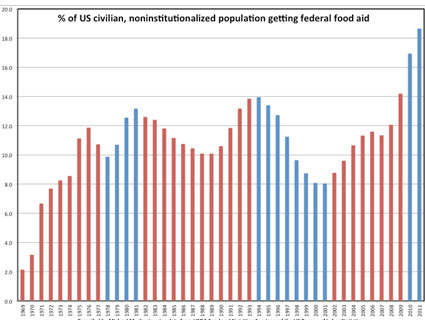
<a href="http://www.shutterstock.com/cat.mhtml?lang=en&search_source=search_form&version=llv1&anyorall=all&safesearch=1&searchterm=hunger&search_group=#id=118325473&src=dUvHlcPg7o1oKq6Z2APkTw-1-42">Evgeny Atamanenko</a>/Shutterstock
On Wednesday the Senate agriculture committee approved a GOP proposal that would amend the farm bill the Senate is considering to ban “convicted murderers, rapists, and pedophiles” from getting food stamps. On its surface, the idea sounds unobjectionable, but the measure would have “strongly racially discriminatory effects,” according to the non-partisan Center on Budget and Policy Priorities (CBPP).
The amendment, introduced by Sen. David Vitter (R-La.), and agreed to by unanimous consent in the committee, would bar anyone who has ever been convicted of certain violent crimes—even if they committed the crimes in their youth and have served their sentence—from ever getting food stamps (called SNAP benefits) ever again. CBPP president Robert Greenstein slammed the amendment in a statement Tuesday, calling it “stunning.” Because African Americans are incarcerated at a higher rate than other races, he says, “the amendment would have a skewed racial impact. Poor elderly African Americans convicted of a single crime decades ago by segregated Southern juries would be among those hit.” Under current law, there is only a lifetime ban on food stamps for convicted drug felons, and many states have opted out of that ban.
The measure wouldn’t just hurt ex-cons. Greenstein points out that “the amendment would mean lower SNAP benefits for their children and other family members.”
Plus the amendment could cause higher rates of recidivism. “Ex-offenders often have difficulty finding jobs that pay decent wages,” Greenstein says. “The amendment could pose dilemmas for ex-offenders who are trying to go straight but can neither find jobs nor, as a result of the amendment, obtain enough food to feed their children and families.”
The House of Representatives has also voted to cut food stamp funding from the farm bill; their plan would throw some 2 million people off the program.
There’s still time to rethink the senators’ ill-conceived plan, though, Greenstein says. “The farm bill is still on the floor, and the amendment can still be modified,” he says. “Senators should gather the courage to step up to the plate and address this matter.”












